canterbury
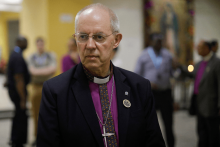
Archbishop of Canterbury Justin Welby resigned “in sorrow” on Tuesday, saying he had failed to ensure there was a proper investigation into allegations of abuse by a volunteer at Christian summer camps decades ago.
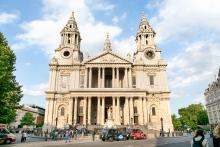
Nicholas Chamberlain, the bishop of Grantham, has come out as the first Church of England bishop to openly acknowledge he is gay. Chamberlain, 52, said in an interview with the Guardian published Sept. 2 that he is living with a man and in a long term loving relationship, though it does not involve sex.
The Guardian predicted that Chamberlain’s announcement “will be embraced by campaigners for equality but is likely to alarm conservatives who fear the church is moving away from traditional teachings.”
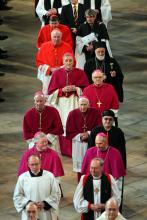
A well-known Anglican bishop in charge of the archbishop of Canterbury’s campaign to attract young people to the church says he’s ready to put on blue jeans and a T-shirt.
“There are people for whom vestments are profoundly helpful and those for whom they are a real obstacle,” said Bishop Graham Cray who heads the ”Fresh Expressions” campaign.
His statement follows reports that the General Synod, the Church of England’s governing body, is prepared to debate a controversial motion that would make clerical vestments optional.
In a letter to Synod members, the Rev. Christopher Hobbs, vicar of St Thomas in Oakwood, North London, wrote: “In all walks of life people are less formal. And sometimes informality is good even in a very traditional parish.”

For the first time on record, the number of Scots with no religion outstrips those who belong to the Church of Scotland.
Figures from the 2011 census released Monday show that 37 percent of Scottish people regard themselves as nonreligious, while 32 percent said they identified with the Church of Scotland, known as the Kirk. Some 16 percent said they were Roman Catholic.
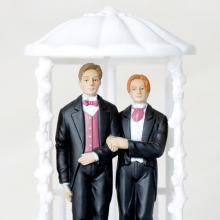
CANTERBURY, England — The British government unveiled a proposal on Tuesday that excludes the Church of England and the Church in Wales from planned legislation to allow same-sex couples to marry in churches.
Culture Secretary Maria Miller told Parliament the new plan would allow gay and lesbian couples to marry in some churches, synagogues, temples, and mosques, but definitely not in the established church, where both the outgoing and incoming archbishops of Canterbury insist that marriage remain between a man and a woman.
"We will write on the face of the bill a declaration that no religious organization, or individual minister, can be forced to marry same-sex couples or to permit this to happen on their premises," Miller told the House of Commons.
Religious groups, including Quakers, Unitarians, and some liberal Jewish groups, welcomed the news because they favor same-sex marriage. The Church of England, the Church in Wales, the Roman Catholic Church, most Muslims, and Orthodox Jews oppose the move.
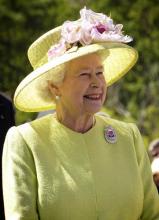
LONDON — As Britain awaits the appointment of the next archbishop of Canterbury to lead both the Church of England and the far-flung Anglican Communion, there's renewed attention on the woman who officially gets the final say: Queen Elizabeth II, the "Defender of the Faith."
The current archbishop, Rowan Williams, ends his 10-year tenure in December. A Church of England committee is sifting through candidates — two of whom will be submitted to Prime Minister David Cameron, whose top choice will be submitted to the queen for final approval.
When he announced his retirement last March, Williams, 62, famously said his successor will need "the constitution of an ox and the skin of a rhinoceros.”
Politicians and religious leaders say the next archbishop will need those qualities and more to handle deep divisions in the British church over female bishops and North/South divisions among his 77 million-member global flock over sexuality.
But he'll also need something else: the ability to envision life when Elizabeth — who turns 87 next year — is no longer on the throne, and when Britain is no longer a Christian-majority country.
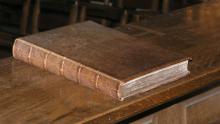
"Ashes to ashes, dust to dust." "All the deceits of the world, the flesh and the devil." "Read, mark, learn, and inwardly digest."
Shakespeare? The King James Bible? Close -- the Anglican Book of Common Prayer, the liturgical and literary masterpiece that along with the playwright and the landmark Bible helped shape the English language, marks its 350th anniversary this year.
St. Paul's Cathedral in London celebrated the occasion on Wednesday (May 2) with a special service of evensong, or evening prayer, from the 1662 volume, often shortened to the BCP or Prayer Book. Archbishop of Canterbury Rowan Williams was there, along with members of Prayer Book societies in Australia, Canada and the U.K. that are dedicated to keeping the work alive.